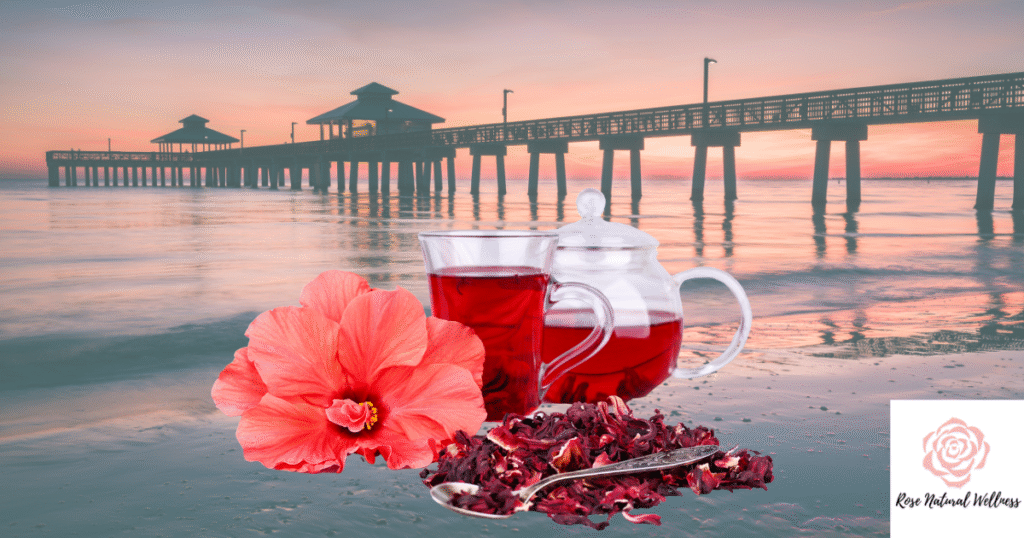
Looking for a refreshing drink to beat the Florida heat? Hibiscus tea isn’t just beautiful and delicious—it’s packed with health benefits too. Whether you enjoy it hot or iced, this vibrant, ruby-red tea supports heart health, hydration, and more! Hibiscus tea is the perfect summer wellness companion, especially for those sweltering Southwest Florida days. Discover the hibiscus tea's amazing health benefits and enjoy a delicious, cooling beverage all summer long!
Hibiscus tea is an herbal infusion made from the dried petals of the Hibiscus sabdariffa flower. With its deep red hue and tart, cranberry-like flavor, this tea is enjoyed around the world for both its taste and its health benefits.
Historically, hibiscus has been used in various cultures for centuries as a medicinal plant. In Egypt, it was consumed to help lower body temperature. In West Africa, it’s part of traditional herbal remedies. In Mexico and Central America, “agua de Jamaica” is a staple summer drink.
Its rise in modern wellness circles stems from both tradition and science. Studies continue to reveal the powerful antioxidant, anti-inflammatory, and cardiovascular benefits of this vibrant plant.
Best of all, hibiscus tea is incredibly versatile. It can be brewed hot like a traditional tea or steeped and chilled for a refreshing iced beverage. Many people enjoy adding citrus, mint, or fruit for an extra burst of flavor, making it an easy addition to any wellness routine.
Hibiscus tea is loaded with plant-based compounds such as anthocyanins and flavonoids, which give the flower its bright red color and potent health properties. These antioxidant properties help neutralize free radicals in the body, which may reduce chronic inflammation—a known contributor to aging, hormonal imbalance, and many health issues.
One of the most researched benefits of hibiscus tea is its potential to support heart health. Several studies have shown that regular consumption of hibiscus tea can help lower both systolic and diastolic blood pressure in individuals with mild hypertension. It may also help reduce LDL (“bad”) cholesterol levels, supporting overall cardiovascular function and promoting a healthier heart.
Beyond cardiovascular support, emerging research highlights hibiscus tea’s role in supporting healthy fat metabolism. Compounds found in hibiscus have been shown to inhibit the activity of enzymes involved in fat absorption and storage, potentially helping reduce the accumulation of body fat. This effect may contribute to better weight management when combined with a balanced diet and active lifestyle.
For women over 30, who may begin noticing shifts in metabolism or cardiovascular health, incorporating hibiscus tea can be a proactive and natural addition to their wellness routine—supporting both heart health and healthy body composition.
Hibiscus tea has mild diuretic effects, which can help reduce bloating or puffiness—especially helpful during hot, humid weather when water retention is more common. Unlike synthetic diuretics, hibiscus helps you flush excess fluids without taxing your kidneys or depleting important electrolytes when used in moderation.
Staying hydrated is key, particularly in Florida’s subtropical climate. Hibiscus tea is caffeine-free, making it a great alternative to dehydrating sodas, coffee, or sugary iced teas. Whether you’re sipping it poolside or post-workout, it supports your body’s hydration needs without the crash.
For women navigating hormonal changes, such as perimenopause or menopause, hibiscus tea offers natural support. Its cooling properties may help alleviate hot flashes, and its overall calming effect makes it a great choice during times of stress or transition.
Even during summer, some people prefer a warm beverage to soothe digestion or unwind. Try steeping dried hibiscus flowers with ginger and cinnamon, then sweeten with local honey for a calming evening tea.
Mocktails: Mix chilled hibiscus tea with sparkling water, lime juice, and a touch of agave syrup for a party-ready, alcohol-free treat.
The best time to drink hibiscus tea? Whenever you need a hydration boost! It’s a smart option mid-afternoon when energy dips or first thing in the morning if you want a caffeine-free start to your day.
Hibiscus tea is generally safe, but there are a few exceptions. If you are pregnant or breastfeeding, it’s best to consult your doctor before adding it to your diet. Hibiscus may also interact with medications for blood pressure or diabetes, so speak to your healthcare provider if you’re on prescription medications. It is best to drink less than 15 cups per day of hibiscus tea.
Many bottled hibiscus drinks are marketed as “healthy,” but they often contain added sugars or preservatives. Brew your own at home when possible to maintain full control over the ingredients.
While hibiscus tea alone isn’t a magic solution for weight loss, its ability to support hydration, reduce bloating, and offer a low-calorie alternative to sugary drinks can complement a balanced diet and active lifestyle.
Absolutely! Many people use hibiscus tea as a flavorful replacement for soda, sweet teas, or even coffee. Its tart, fruity taste satisfies the craving for something bold, without the sugar crash or caffeine dependence.
Hibiscus tea is more than just a pretty drink—it’s a powerhouse of plant-based wellness. Whether you’re sipping it hot during a rainy afternoon or chilled under the Florida sun, this antioxidant-rich tea is a delicious, simple way to nourish your body.
Especially in Southwest Florida’s relentless summer heat, hydration becomes non-negotiable. Choosing hibiscus tea is a flavorful, functional way to support heart health, manage stress, reduce inflammation, and support your well-being—all while keeping you cool.
As with most wellness practices, consistency is key. Adding a glass of hibiscus tea to your day might seem like a small act, but those small acts can add up to big changes. Sip often, stay cool, and enjoy the simple power of nature’s plants to support your health—one vibrant glass at a time.